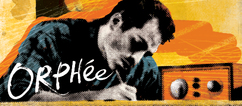|
[Between the last post and this one, it will probably seem like I have some sort of obsession with, or vendetta against, Philip Glass. And I don’t, at least, I don’t mean to. It just so happens that, at roughly the same time this site launched, I heard an interview/lecture and two live performances of Glass’s music, so it only seems obvious that I’d be writing about it. Don’t worry: It’s my solemn oath that his music will not be featured so prominently in my future post(s).]  Here’s my first disclaimer: As much as I love film, and consider myself to be something of a film buff, I’ve never seen any of Jean Cocteau’s work. Not Beauty and the Beast, not Les Enfants Terribles, not anything. This hasn’t been intentional, by the way; I just haven’t gotten around to it yet. Second disclaimer: I am very aware, perhaps too aware, of Philip Glass’s music. Not only have I listened to a great deal of it, but I’ve intentionally sought out works of his that I’m unfamiliar with, and I’ve studied several of his scores in depth. I mention both of these disclaimers because Orphée is an opera by Philip Glass that is very closely based (almost word-for-word, in fact) on a film by Jean Cocteau. This is an opera that, even if it is new to you, may be difficult to come into without some sort of baggage. I know it was for me. Orphée is based on (or perhaps “loosely inspired by” would be more accurate) the Greek myth of Orpheus’s journey to the underworld to save his wife, Eurydice. It has been updated to an unspecified place and time where people speak French and talk a lot about poetry, and where motorcyclists have a tendency to hit people and kill them, sometimes more than once. This doesn’t serve to make the story bad, but it does make it unusual, particularly when used as the basis for an opera. As presented by Pittsburgh Opera, with direction by Sam Helfrich and set design by Andrew Lieberman, Orphée is a gorgeous, sumptuous production. The film, from what I can gather, makes creative use of mirrors and mirror images, and this is something that the production handles in ways that I will not explain, except to say that they are beautiful, surprising, and wonderfully eerie. As a technical work of theatre, Orphée is an undeniable success. As a work of music, I’m not so sure. If you don’t like Philip Glass’s music, there is probably little in Orphée to convince you otherwise. The score is heavily repetitive, with pulsing rhythms that don’t seem to go anywhere, and textures that are interesting but outstay their welcome. One issue with a lot of contemporary operas is that the time-honored contrast between aria (song) and recitative (sung music that advances the plot) has been largely discarded in favor of endless recitatives. Instead of proper operas, they’re more like plays set to music, and the result is a lack of breathing room and the complete absence of anything like “showpieces” for the singers. Orphée does nothing to buck this trend. This is not the kind of opera that will featured on a best-of compilation, or that will be remembered for a particularly lovely aria. It is rhythm and texture, with little in the way of harmonic progression or melodic interest. What I wasn’t expecting, and was pleasantly surprised by, was how well the story worked. Underneath the inherent strangeness of the material is a narrative of depth and richness, with really interesting things to say about life, death, love and creativity. This, I believe, must largely be credited to Jean Cocteau. What I am a little surprised by, considering Philip Glass’s experience and pedigree, is that the music itself is so poorly written. All of the musicians, both on the stage and in the pit, did the best they could, but the material gave them so little to work with. The vocal lines are flat and forgettable, and even worse, much of the instrumental writing is difficult almost to the point of being unplayable. But these aren’t virtuosic passages of technical wizardry, or featured solos in a concerto; they’re simply dull and badly written, with more attention paid to the texture being created than the actual instruments used to create it. When all is said and done, against my expectations, Orphée worked. It’s a production that I can recommend for the story and how elegantly it is staged, and I can also recommend it for the musicianship on display, even though it is largely wasted. But if it is a success, and again, I believe it is, it succeeds because of Jean Cocteau, because of the depth of his ideas and the creativity with which he explored them, and it succeeds in spite, not because, of Philip Glass’s music.
0 Comments
|
AuthorChris Massa is a US-born musician based in Durham, England. You are on his site right now. Archives
June 2024
Categories
All
|
|
Copyright © Christian David Massa
|

 RSS Feed
RSS Feed